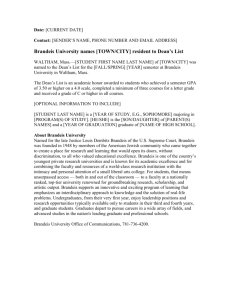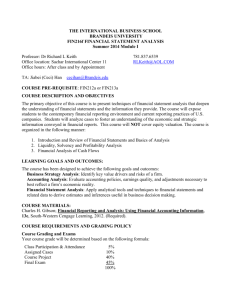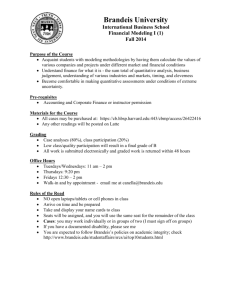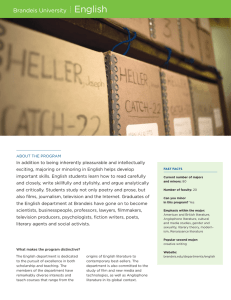Environmental Studies Brandeis University
advertisement
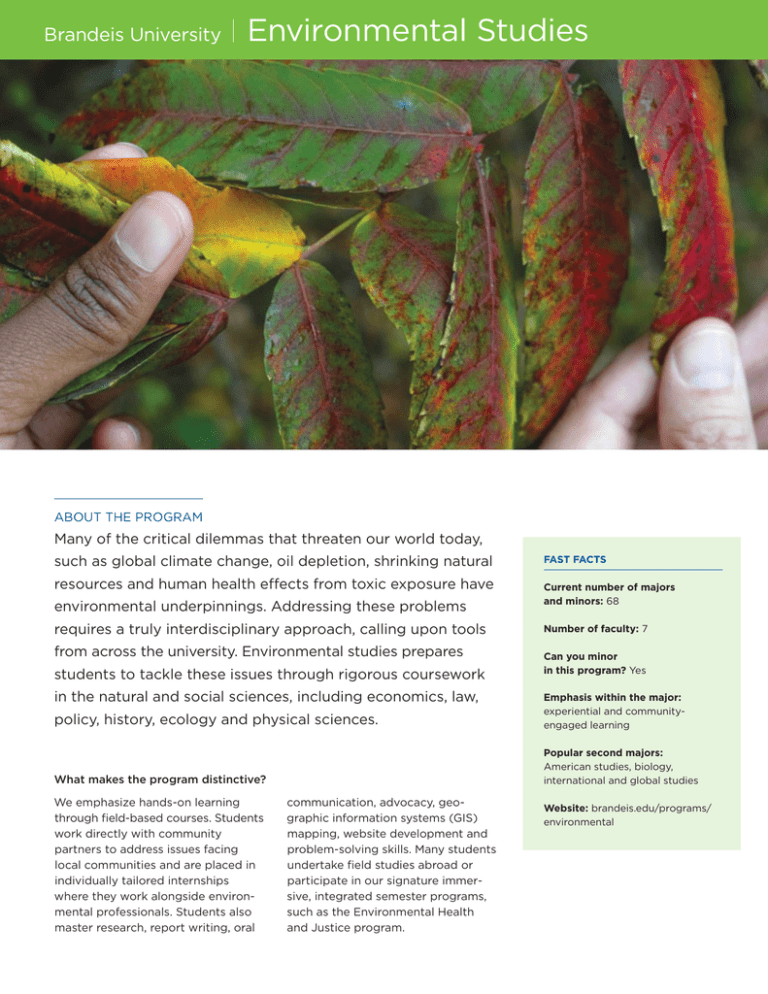
Brandeis University Environmental Studies about the program Many of the critical dilemmas that threaten our world today, such as global climate change, oil depletion, shrinking natural resources and human health effects from toxic exposure have environmental underpinnings. Addressing these problems requires a truly interdisciplinary approach, calling upon tools from across the university. Environmental studies prepares students to tackle these issues through rigorous coursework in the natural and social sciences, including economics, law, fast facts Current number of majors and minors: 68 Number of faculty: 7 Can you minor in this program? Yes policy, history, ecology and physical sciences. Emphasis within the major: experiential and communityengaged learning What makes the program distinctive? Popular second majors: American studies, biology, international and global studies We emphasize hands-on learning through field-based courses. Students work directly with community partners to address issues facing local communities and are placed in individually tailored internships where they work alongside environmental professionals. Students also master research, report writing, oral communication, advocacy, geographic information systems (GIS) mapping, website development and problem-solving skills. Many students undertake field studies abroad or participate in our signature immersive, integrated semester programs, such as the Environmental Health and Justice program. Website: brandeis.edu/programs/ environmental Brandeis University | Environmental Studies Academics and Research Multifaceted approach Environmental studies faculty members are active researchers and practitioners in environmental history, conservation biology, sustainable farming and forestry, and environmental health and justice. Many of these activities are also integrated into coursework, internships and senior projects within the program. We balance fieldwork with rigorous classroom work, with an emphasis on strong writing skills — many of our courses are writing-intensive. Environmental studies at Brandeis is also truly interdisciplinary, laying equal stress on natural and social sciences, and many of our faculty members are interdisciplinary in their own research and writing. Beyond the Classroom The environmental studies program has two experiential learning offerings, engaging, immersive academic programs in which small groups of students explore a thematic topic through inquiry-based courses linked to real-world opportunities: > The Environmental Field Semester (EFS) is an integrated five-course program that runs every other fall. Twelve to 15 students enroll in a roster of courses that forms a single, coherent semester-long program featuring classroom work, GIS training, field trips, work on a community farm and guided field research on local conservation land. The EFS addresses the history, ecology, conservation and stewardship of land in New England. It is taught by Brian Donahue with assistance from other faculty. > Environmental Health and Justice Community Field Semester is a hands-on, multidisciplinary, community-engaged learning program. Students collaborate with community organizations and government agencies to tackle environmental health problems facing primarily low-income residents in areas such as Waltham and urban Boston and coal-mining communities in Appalachia. They spend much of the semester in the field, acquiring real skills to address environmental health issues effectively: legal research, negotiation, advocacy, interviewing and counseling, study design, sampling methodology and analysis, and oral presentation. The program is taught by Professor Laura Goldin together with scientists associated with the Harvard School of Public Health. Internship offerings The internship program is another hallmark of environmental studies at Brandeis. Internships offer students the opportunity to experience environmental challenges firsthand in government, nonprofit organizations, industry and business, and scientific research organizations. The internship program reaches beyond the campus to provide practical experience individually tailored to each student’s academic goals and capabilities. We have an extensive network of partners who look to Brandeis for first-rate interns and who provide experiences that are challenging and meaningful. Student groups Environmental studies students at Brandeis typically are involved in a number of interrelated campus groups and activities. These include the Campus Sustainability Initiative, which works with faculty, staff and students across the campus to “green” every aspect of the university, from food and landscape to curriculum; and Students for Environmental Action, one of Brandeis’ largest student clubs. After Brandeis Diverse career fields Environmental studies majors have gone on to pursue a wide range of careers in environmental management, law, the sciences, education, public health, medicine and other fields, and many are working in environmental agencies, schools, conservation and ecology organizations, consulting and law firms, among other settings. A number of students have gone on to earn graduate degrees in conservation biology, ecology, law, environmental management and forestry; others have studied architecture, economics, history, medicine, pharmacy, public health and veterinary medicine, often with an environmental bent. “This semester, my education was so much more a part of my life than it has ever been. I felt like I was always building something — developing an understanding of where I am, what is important to me and how I want to design my life in a way that is meaningful and healthy for me. I have never before had such a personal, holistic and comprehensive learning experience.” Environmental studies student Photo by Ken Schles Office of Communications ©2016 Brandeis University G067

